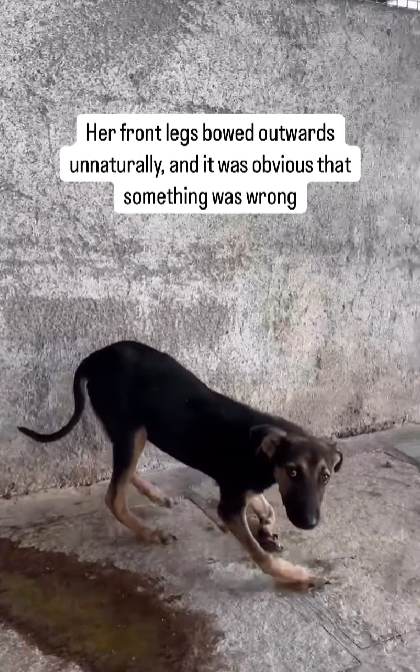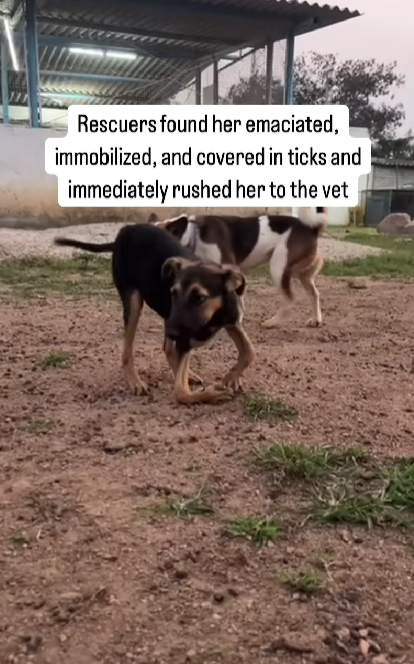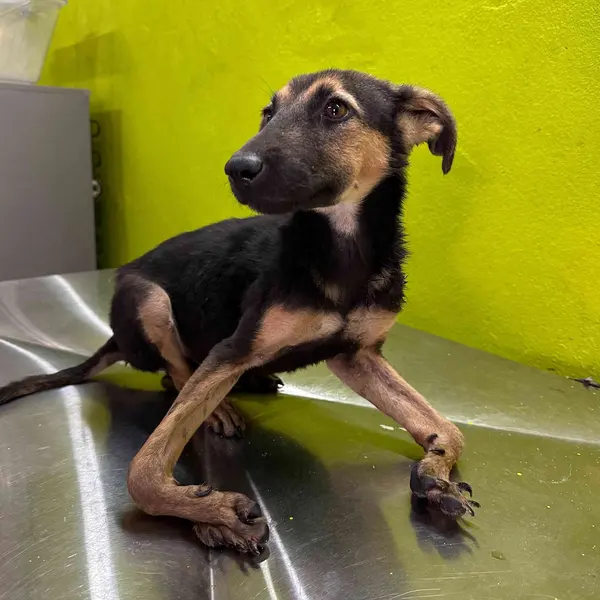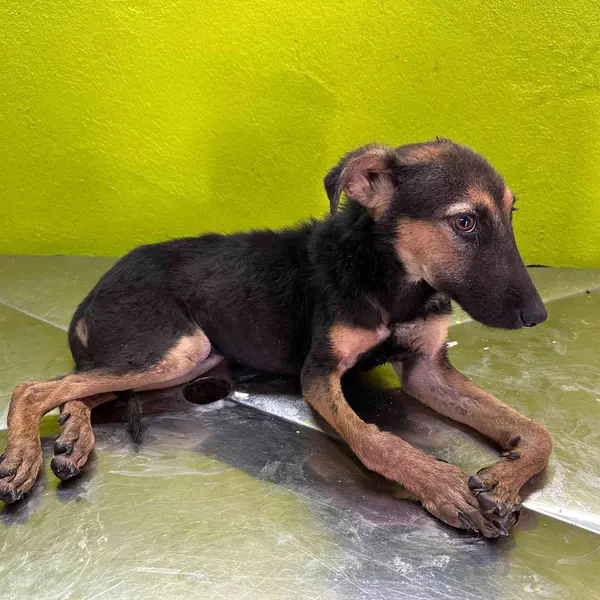This Puppy Walked on Her Elbows & Was Starving—Until One Rescue Gave Her a Second Chance
Puppies are incredibly fragile, and even a slight lack of care can lead to serious health issues. That’s exactly what happened to Kiwi, a stray puppy in India who developed a severe skeletal condition in her legs due to prolonged starvation.
With her legs unnaturally bent, Kiwi was forced to hobble on her elbows to move. Though countless passersby witnessed her suffering, no one stopped to help. Curled up in a ball, whimpering in pain, she waited for rescue that never came—until the Stray Animal Foundation of India found her and gave her the chance she so desperately needed.
Source: Facebook
The Fight Against Rickets
After nearly losing all hope, Kiwi was given a second chance by a charity based in Hyderabad, India. When the staff discovered her frail, tick-covered body and the troubling condition of her legs, they immediately rushed her to their facility for urgent care.

No longer struggling on the streets, Kiwi was finally in safe hands. She underwent an emergency blood transfusion, and the medical team conducted a thorough examination to determine the cause of her leg deformities.
The diagnosis revealed that Kiwi has Rickets, a skeletal disease primarily caused by vitamin D deficiency, leading to bowed and swollen bones. The charity believes that severe starvation played a major role in the development of her condition.
Kiwi’s Healing Process Begins

The charity has begun Kiwi’s treatment and recovery journey. Her body is now completely free from parasites, and she is slowly regaining her strength.
Rickets is a curable disease, but its treatment requires time, effort, and meticulous care. Kiwi will need vitamin supplements and a well-balanced diet to compensate for the severe nutritional deficiencies she suffered during her early life.
However, the cost of her treatment is expected to exceed $2,000, and the charity cannot cover it alone. They are reaching out for public support to ensure Kiwi receives the medical care she desperately needs.
If you’re able, consider contributing to Kiwi’s recovery through CUDDLY’s fundraiser where you can also donate essential supplies from her wishlist.

Pet Rescue Advocate Rocky Kanaka is also urging animal lovers to come forward to help Kiwi. He says, “Kiwi has endured so much, but with love, care, and the right nutrition, she has a real shot at a happy, healthy life. Rescue isn’t just about saving lives—it’s about giving dogs like Kiwi the future they were always meant to have.”
In a Facebook update shared by the charity, Kiwi is no longer hobbling on her elbows. Instead, she is now walking normally on all her legs thanks to the veterinary team, supplements, nutritious food, and all the love and care she has been getting at the charity.
What is Rickets in Dogs?
Rickets is a disease that affects puppies, causing them to walk abnormally, experience bone pain, and even suffer from leg fractures. Dr. Ellen Russell states, “Rickets is generally treatable by quickly providing a properly balanced diet with vitamins and minerals.” However, if left untreated, it can lead to permanent bone damage in puppies.
Causes of Rickets Disease in Dogs

Rickets in dogs occur due to an imbalance or deficiency of essential nutrients like phosphorus, vitamin D, or calcium levels in the growing body.
Puppies typically obtain these nutrients from their diet. Dogs develop rickets when their food lacks sufficient vitamins or minerals. Also, growing dogs require adequate sunlight to synthesize vitamin D, essential for bone growth.
Without adequate nutrition, growth plates in bones, responsible for new bone growth, become malnourished. This hinders normal bone formation and development.
Large and giant breed dogs, with rapid growth rates, are more susceptible to rickets and other developmental bone and joint diseases due to malnutrition, compared to smaller breeds.
Rickets in Dogs Symptoms
A Reddit user, u/Priyankpal01, posted a photo of his St. Bernard puppy saying, “My Saint Bernard’s front legs are bent is it Rickets or something.” So, let’s get into what are the symptoms of rickets.
According to Dr. Russell, rickets can manifest in various ways in puppies. Keep an eye out for these clinical signs in dogs:
Physical Symptoms
- Lameness
- Abnormal gait
- Swelling in bones and joint pain
- Bowed limbs
- Bone fractures
Behavioral Symptoms
- Difficulty getting up after lying or sitting down
- Not inclined to play
- Depression
- Hesitance to move around
Rickets in Dogs Treatment

As per Dr. Zack Coston, “Treatment for rickets relies on addressing dietary deficiencies, especially vitamin D deficiencies.” Since vitamin D is the primary cause of rickets in dogs, veterinarians will work to increase vitamin D levels in the dog’s diet.
Supplements can help correct deficiencies in vitamin D, calcium, and phosphorus. Providing dogs with complete and balanced dog food ensures they receive all necessary nutrients to prevent future deficiencies.
Treating underlying illnesses is also important. If an underlying issue is causing nutrient absorption problems, veterinarians will treat the underlying disease. Deworming procedures may also be necessary if parasites are causing nutrient deficiencies.
Anti-inflammatory medication can help reduce pain and discomfort caused by bone deformities. Rest is also essential, as puppies with rickets need time to prevent fractures and allow bone density to improve.
FAQs (Frequently Asked Questions)
Can rickets be cured in dogs?
Yes, rickets is a curable disease. In most cases, young dogs that receive treatment will start improving quickly. The outlook is generally good if there are no broken bones or irreversible bone damage. Recovery time varies depending on the individual case. If a puppy has broken bones, recovery time will be longer. Regular follow-ups with a veterinarian are necessary to ensure treatment is effective.
What are some home remedies for rickets in dogs?
To help your dog recover from rickets, it’s essential to correct their diet and ensure they receive a complete and balanced meal. Additionally, provide your puppy with ample rest while their symptoms improve. At this stage, they’re prone to bone fractures, and their bones may be too painful for play.
Is rickets in dogs genetic?
A rare, inherited condition known as vitamin D resistance can cause a unique form of rickets in dogs. Treatment for this condition differs from the more common type, but a balanced diet and supplements remain essential for effective management.






